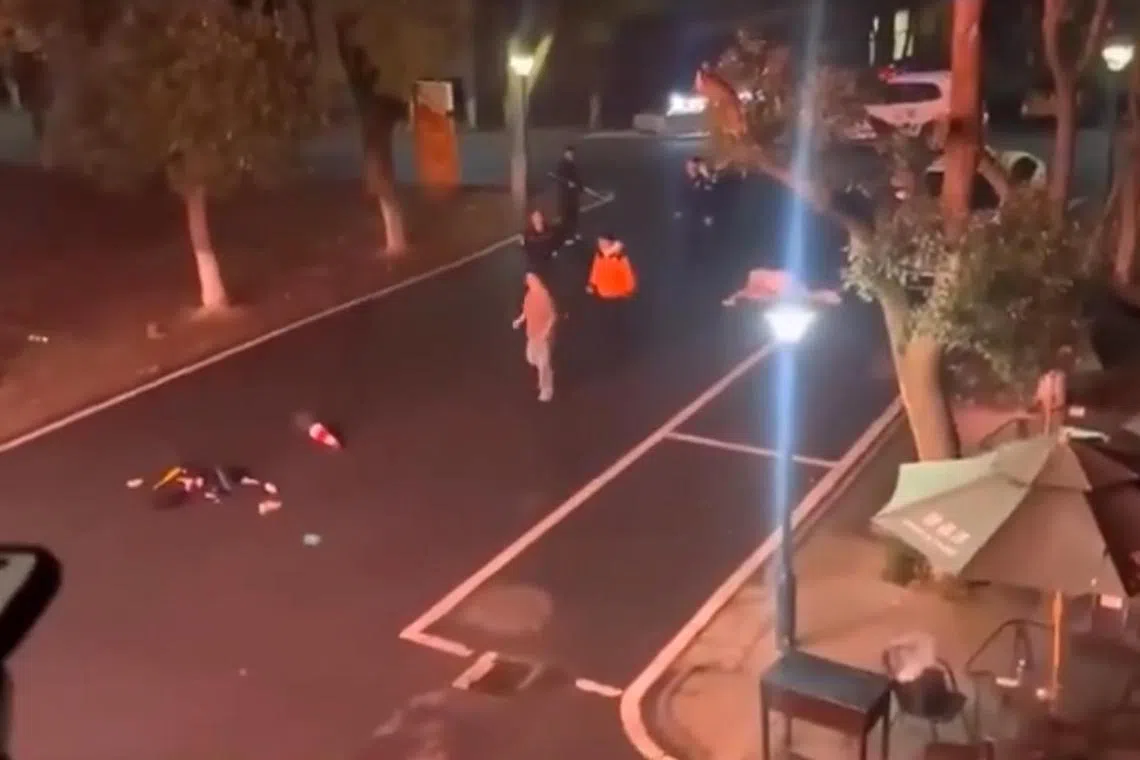Eight dead, 17 hurt in China school knife attack
Sign up now: Get insights on Asia's fast-moving developments

The attack took place in the evening at the Wuxi Vocational Institute of Arts and Technology, in the city of Yixing in Jiangsu province.
PHOTO: @OSIOSINT1/X
BEIJING - A former student went on a stabbing rampage at a vocational college in eastern China on Nov 16, killing eight people and injuring 17 others, police said, just days after the deadliest mass killing in the country in a decade shocked Chinese society.
The attack took place in the evening at the Wuxi Vocational Institute of Arts and Technology in the city of Yixing in Jiangsu province, police in Yixing said in a statement, confirming the toll.
The suspect was apprehended at the scene and confessed to his actions, the police added.
The police said the suspect was a former student who was meant to graduate in 2024 but failed his exams.
“According to preliminary investigations, the suspect, surnamed Xu – male, 21 years old, a 2024 graduate of the college – attacked others after failing an exam and not receiving his graduation certificate, as well as being dissatisfied with his internship compensation,” a statement by the Yixing Public Security Bureau said.
“He returned to the school to express his anger and commit these murders,” it said, adding that the suspect had confessed and that the incident was being investigated.
The school offers courses to prepare students to work in industries including wire and cable manufacturing, interior design and marketing, according to its website.
The junior college and others like it are part of a drive to direct more young people into job-specific training instead of enrolling in oversubscribed universities.
That movement has been held back by the stigma attached to vocational college instead of a competitive university, analysts say.
The school – which has about 12,000 students from around the world, according to its website – is located about 150km west of Shanghai.
In Yixing, police said emergency services were fully mobilised to treat the wounded and provide follow-up care for those affected by the attack.
‘Mental health’
No video of the attack was immediately seen on social media – a sign that the authorities possibly removed footage from various platforms.
Violent knife crime is not uncommon in China, where firearms are strictly controlled, but attacks with such a high death toll are relatively rare.
Last week, a 62-year-old man killed 35 people and wounded 43 more
He was reportedly angry at the terms of a divorce settlement.
The authorities said on Nov 16 that the man had been charged.
That incident touched off a rare online discussion over the mental health of Chinese society and whether a string of recent high-profile attacks in other major cities could reflect deeper stresses as the world’s second-largest economy slows.
It also prompted an intervention by President Xi Jinping, who urged local police to “strengthen their control of risks” by identifying people at risk of lashing out.
One user of the popular X-like site Weibo said: “What kind of state of despair must these people be in to go to such extremes?”
Another user said: “Security on campuses must be boosted, along with more education about mental health, so other dramas like these do not happen.”
Lamented another Weibo user: “The rich-poor divide is getting bigger and bigger. Everyone must work hard these days to survive.”
One online commentator said the Wuxi attack appeared to reflect a sense of entitlement for a generation that had not expected hardship, a “giant baby mentality”.
“Always thinking that they are so aggrieved, everyone is persecuting me, I study and struggle just to be a beast of burden,” one person wrote on Weibo on Nov 17.
“I want to ‘lie flat’, I want to rot, but still want to have this and that, I want to have what others have,” the post said.
Professor Qu Weiguo from Fudan University said the recent cases of “indiscriminate revenge against society” in China had some common features: disadvantaged suspects, many with mental health issues who believed that they had been treated unfairly and who felt that they had no other way to be heard.
“It is important to establish a social safety net and a psychological counselling mechanism, but in order to minimise such cases, the most effective way is to open public channels that can monitor and expose the use of power,” he posted on Weibo.
The short essay had been removed by the censors by the afternoon of Nov 17.
It seemed that certain other comments were also taken down from Weibo, notably under posts with official media accounts of the Yixing incident.
CCTV’s account appeared to have sparked 6,357 comments, but only a handful were visible.
There has been a spate of attacks in recent months.
At least six other high-profile knife attacks have been recorded in 2024 across China
In October in Shanghai, a man killed three people and wounded 15 others
And the month before, a Japanese schoolboy was fatally stabbed
In March 2014, a knife attack on train passengers at a station in Kunming left about 30 people dead, and more than 140 wounded.
The authorities blamed separatist militants from the troubled Xinjiang region for that incident. AFP, REUTERS


